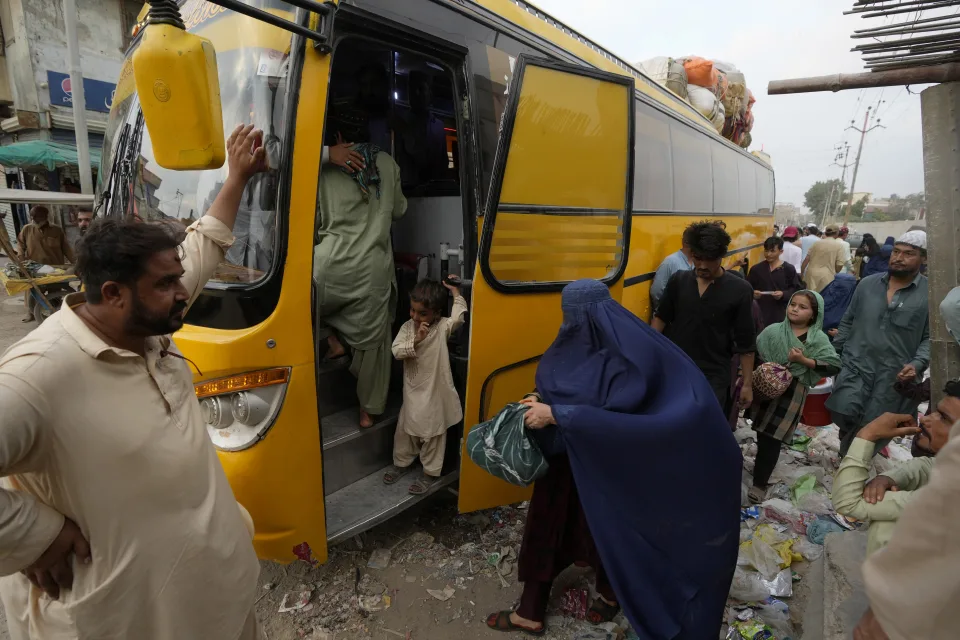UN Urges Pakistan To Prevent Forced Deportations Of Afghan Refugees To Avert Human Rights Crises
In response to Pakistan's recent announcement of plans to crack down on undocumented migrants, including 1.7 million Afghans, UN urges Pakistan to prevent forced deportations of Afghan refugees to avert human rights crises.
Author:Elisa MuellerReviewer:Camilo WoodOct 08, 20239.7K Shares152.4K Views

Amid a "severe humanitarian crisis," Afghanistan is grappling with numerous human rights challenges, with women and girls facing particular hardships, according to the United Nations (UN).
Meanwhile, in response to Pakistan's recent announcement of plans to crack down on undocumented migrants, including 1.7 million Afghans, UN urges Pakistan to prevent forced deportations of Afghan refugees to avert human rights crises.
Pakistan's Crackdown On Undocumented Migrants
Pakistan recently declared its intention to address the issue of undocumented migrants living in the country, a move that has sent shockwaves through its Afghan refugee population.
The government's announcement came with a deadline of October 31 for migrants, irrespective of their nationality, to leave Pakistan voluntarily or face mass arrests and forced deportation.
The government maintains that the focus is on individuals residing illegally in Pakistan, regardless of their nationality.
Authorities have even initiated measures such as setting up a hotline and offering rewards to those reporting undocumented migrants. However, critics argue that this sweeping policy disproportionately affects Afghan refugees.
UN Warns Of Human Rights Violations
In response to Pakistan's decision, the United Nations High Commissioner for Refugees (UNHCR) and the International Organization for Migration (IOM) issued a joint statement expressing grave concerns.
They warned that the forced repatriation of Afghan nationals could lead to severe human rights violations, including the separation of families and the deportation of minors.
These agencies acknowledged Pakistan's sovereign prerogative over domestic policies but emphasized the need for safe, dignified, and voluntary returns for migrants.
They called on all countries to suspend forcible returns of Afghan nationals and ensure that any repatriations are conducted in a humane manner.
Afghanistan's Ongoing Humanitarian Crisis
The UN agencies' concerns regarding the forced repatriation of Afghan nationals are rooted in Afghanistan's dire humanitarian situation.
Afghanistan has been facing significant challenges, especially for women and girls, under the rule of the Taliban.
The group has imposed strict restrictions, including a ban on women's education beyond the sixth grade and limited access to public spaces and job opportunities.
Pakistan's crackdown on Afghan migrants could exacerbate the already dire circumstances in Afghanistan, leading to further protection risks for those returning.
A Long History Of Afghan Refugees In Pakistan
Pakistan's announcement has triggered a series of reactions, both domestically and internationally.
In Islamabad, landlords and real estate owners have been ordered to evict "illegal Afghans" and their families by the end of the month or face legal action.
Police have enlisted the help of clerics in some mosques to encourage residents to report Afghans living in their neighborhoods.
Thousands of people have been arrested across the country since the crackdown began, with a significant number being Afghan nationals.
In response to the crackdown, Afghan rights groups and the Taliban-led administration have criticized Pakistan's actions.
The Afghan Embassy in Islamabad expressed concern about the increasing pressure on Afghan migrants and reported incidents of harassment and mistreatment.
Pakistan has been a sanctuary for Afghan refugees for over four decades, stemming from the mass exodus during the Soviet occupation of Afghanistan from 1979 to 1989.
At its peak, this led to one of the world's largest refugee populations. Over the years, more Afghans have sought refuge in Pakistan, including an estimated 100,000 after the Taliban's takeover of Afghanistan in August 2021.
Pakistan's decision to crack down on undocumented migrants also comes in the context of rising security concerns.
The Pakistani Taliban (TTP), with bases in Afghanistan, frequently crosses the border to carry out attacks on Pakistani security forces. While the TTP is a separate entity from the Afghan Taliban.
Final Words
Afghanistan faces severe human rights challenges, particularly for women and girls, while Pakistan's recent crackdown on undocumented migrants, including Afghan refugees, has raised concerns about potential human rights violations.
The United Nations and international agencies have expressed grave concerns about the forced repatriation of Afghan nationals and called for safe and voluntary returns.
This situation unfolds against the backdrop of Afghanistan's ongoing humanitarian crisis, worsened by the Taliban's rule.
Pakistan's actions have sparked domestic and international reactions, highlighting the complexities of the longstanding Afghan refugee issue and Pakistan's security concerns.

Elisa Mueller
Author
Elisa Mueller, a Kansas City native, grew up surrounded by the wonders of books and movies, inspired by her parents' passion for education and film.
She earned bachelor's degrees in English and Journalism from the University of Kansas before moving to New York City, where she spent a decade at Entertainment Weekly, visiting film sets worldwide.
With over 8 years in the entertainment industry, Elisa is a seasoned journalist and media analyst, holding a degree in Journalism from NYU. Her insightful critiques have been featured in prestigious publications, cementing her reputation for accuracy and depth.
Outside of work, she enjoys attending film festivals, painting, writing fiction, and studying numerology.

Camilo Wood
Reviewer
Camilo Wood has over two decades of experience as a writer and journalist, specializing in finance and economics. With a degree in Economics and a background in financial research and analysis, Camilo brings a wealth of knowledge and expertise to his writing.
Throughout his career, Camilo has contributed to numerous publications, covering a wide range of topics such as global economic trends, investment strategies, and market analysis. His articles are recognized for their insightful analysis and clear explanations, making complex financial concepts accessible to readers.
Camilo's experience includes working in roles related to financial reporting, analysis, and commentary, allowing him to provide readers with accurate and trustworthy information. His dedication to journalistic integrity and commitment to delivering high-quality content make him a trusted voice in the fields of finance and journalism.
Latest Articles
Popular Articles
